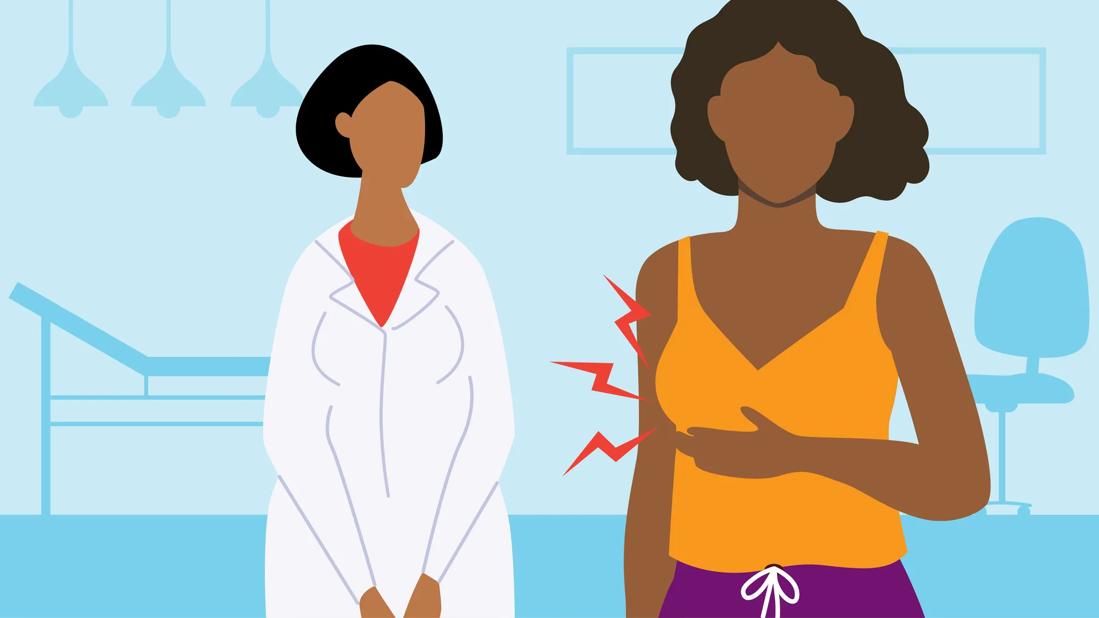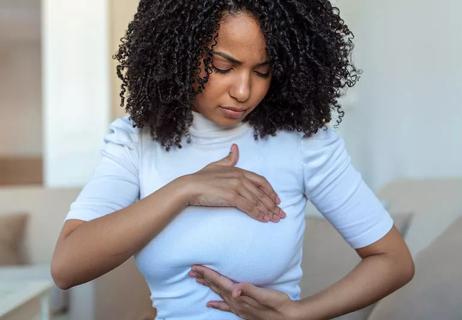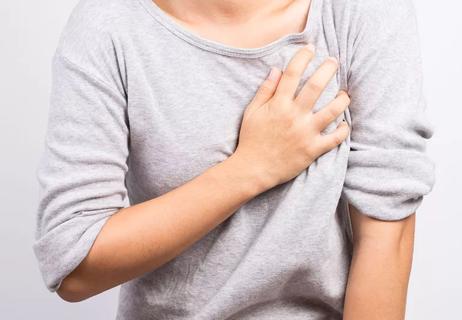A breast abscess feels like a hot, hard and painful lump — seek support from a healthcare provider at first signs of an infection

Perhaps no two words can send a shiver up your spine quite like “breast abscess.” No one wants to imagine their breasts as hosts to infection.
Advertisement
Cleveland Clinic is a non-profit academic medical center. Advertising on our site helps support our mission. We do not endorse non-Cleveland Clinic products or services. Policy
But it happens. And catching an infection early can make it much more bearable.
We talked with Ob/Gyn Ashley Brant, DO, about the signs and symptoms of breast abscesses and what to do if you have one.
Like abscesses that can happen elsewhere on your body, a breast abscess is a collection of fluid that builds up. It’s a severe infection and commonly a complication of mastitis — inflamed breast tissue that can lead to bacterial infection.
“A breast abscess is a walled-off collection of pus that’s extremely painful,” Dr. Brant explains. “Fortunately, it’s treatable.”
Anyone can get a breast abscess, but they’re most common in breastfeeding women.
Here’s why.
When you’re breastfeeding, your body stores milk in sacks and sends that milk through the ducts in your breasts to feed your baby. There can be a mismatch between how much you’re signaling your body to make milk through stimulation via a pump or breastfeeding directly and how completely or frequently you’re emptying your breasts. That can lead the milk sacks to swell, leak and set off a cascade of inflammation or “engorgement.”
Engorgement can lead to an inflammatory (non-infectious) mastitis. That can lead to infectious mastitis and, potentially, a breast abscess if it’s not diagnosed and managed appropriately.
Advertisement
Mastitis and breast abscesses can also happen to people who aren’t breastfeeding. For example, if you have cracked or chapped nipples, bacteria can find their way in. Same if you have an injury to your breast that breaks the skin. Infected nipple piercings can also lead to mastitis and breast abscesses.
If you have a breast abscess, you’ll likely be able to feel it with your hand. It will feel like a hard, red, fluid-filled mass on your breast that is very painful. It may also be warm (even hot) to the touch.
Remember that breast abscesses start as mastitis. So, before you can feel the abscess, you’ll probably have symptoms of mastitis, like redness and tenderness in your breast. You may also notice hard lumps on your breast.
If mastitis continues, you may start to develop flu-like symptoms, like fever and chills. That’s a sign of inflammatory (early on) mastitis or bacterial mastitis.
Breast infections are easiest to treat when caught early. So, seek treatment quickly for signs of mastitis.
“At the first sign of mastitis, contact a healthcare professional to let them know what’s going on,” Dr. Brant advises. “Depending on how severe your symptoms are, your doctor may want you to start on antibiotics.”
If you’re breastfeeding, your provider can prescribe antibiotics that are safe so you can continue breastfeeding while treating mastitis.
If mastitis continues and you develop a breast abscess, a simple round of antibiotics won’t do the trick. Your provider will likely recommend draining the abscess. That’s typically done one of two ways:
Both are outpatient procedures. And you may need to be referred to a specialist for one of these procedures.
If it’s a smaller abscess, your provider may perform the procedure in their office. Larger abscesses may need to be treated in an operating room.
Following a breast abscess procedure, you can continue to breastfeed, though expect that you may experience some discomfort as you heal.
You may also experience soreness and swelling for up to a few weeks. Keep the area clean. And use a hot pack to relieve the pain and reduce swelling.
Advertisement
No one wants to deal with a breast abscess. Seek help at the first sign that something is wrong. Catch it early. And feel better soon!
Advertisement

Sign up for our Health Essentials emails for expert guidance on nutrition, fitness, sleep, skin care and more.
Learn more about our editorial process.
Advertisement

Dry skin, eczema, allergies and infections can all cause itchiness — but in some cases, itching may signify a more serious health condition

Bacterial infections, breast abscesses and clogged milk ducts can all cause inflammation in your breasts

Any mass or abnormal area that you feel for more than three days should be checked out

How to separate serious concerns from minor pain

It’s important to angle it toward your rectum or back, along the natural curve of your vaginal canal

To help manage symptoms, switch to more absorbent period products, make healthy lifestyle changes and explore treatment options

Yes, you can pee with a tampon in; no, they won’t stretch out your vagina or make cramps worse!

Estrogen loss contributes to bone loss, which significantly raises your risk of osteopenia and osteoporosis

Even small moments of time outdoors can help reduce stress, boost mood and restore a sense of calm

A correct prescription helps your eyes see clearly — but as natural changes occur, you may need stronger or different eyeglasses

Both are medical emergencies, but they are very distinct events with different causes